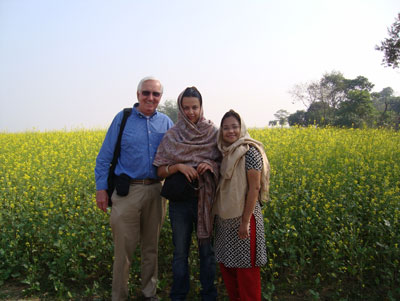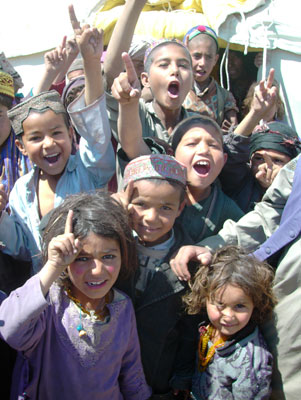Tips on volunteering overseas for the 50-plus crowd
by John Dwyer, Port Townsend, WA
There is a way to travel the world while spending time helping one’s fellow world citizens. It is by volunteering internationally.
Many worthwhile and fulfilling international volunteer opportunities are available to folks over 50 who wish to serve. One can choose from either long-term (two years or more) or short-term (one week or more) assignments.
I began volunteering internationally in 1991 when I joined the Peace Corps. I was sent to Guatemala and, because of my business experience, was a volunteer in the Small Enterprise Development program. This Peace Corps experience has since given me the opportunity to travel to 39 countries and work, usually as a volunteer, in 14 countries. It has been a wonderfully satisfying time.
Do your research
If you have an interest in international volunteering, I would suggest that the first step should be a quick analysis of your interests and skills. I have found that the most successful volunteers are those who are in programs that genuinely interest them. Also, the application of your background and skills enables you to make a greater contribution to the assigned program and community.
If you are unsure of what might interest you, a great way to find out is to volunteer in your local community. After an analysis of your skills and interests, it’s time to begin the examination of placement organizations and the programs they offer.
You should begin your examination of volunteering overseas with a view of the time commitment you plan to make. Short-term assignments are a great way to gain experience in international service and to determine if volunteering abroad is something you would like to pursue on a longer-term basis.
Some organizations require longer-term commitments. The Peace Corps requires a minimum commitment of two years, and some faith-based programs also require longer commitments. Working as a United Nations Volunteer can sometimes involve a long assignment, as well.
There are, however, many organizations that offer one-week programs.
When you are studying the volunteer placement agencies, you should carefully examine the programs and history of the organizations prior to making a choice. The key is to work with an organization that has a track record and is well organized. The one you choose should be working closely with an in-country organization to assure that its programs are providing a needed service to the communities and individuals served.
You should talk with former volunteers over 50 years of age who have associated with the organization that you are considering. Ask them about their experiences and if the organization met their expectations.
Did they feel they made a contribution to the communities served? Was their experience positively utilized? Were the physical requirements within their comfort zones? Were they comfortable with the age mix of fellow volunteers?
Among the many rewards of my past service are the friendships I’ve developed which bridge all ages.
Short-term volunteering
In studying organizations, you’ll find that shorter-term international volunteer assignments, with the exception of some organizations that have particular professional needs, will require that a volunteer pay for transportation and costs associated with the volunteer assignment. These costs are usually tax deductible. Check with the placement organization and with a tax advisor to determine the tax implications.
There are very good reasons that organizations charge volunteers for their placements. The agencies work, in advance, with in-country host organizations to develop programs that fulfill needs and contribute to the country of service. They travel to the program sites to set up housing, medical care, food, transportation, insurance (if offered) and security for the volunteers. All of these tasks require time and financial resources.
Long-term considerations
The following organizations offer international volunteer programs. Contact each organization directly to determine the types and lengths of the programs offered.
Peace Corps — 800/424-8580, www.peacecorps.gov
United Nations Volunteers — phone +49 228 815 2000 (Bonn, Germany), www.unv.org
Earthwatch Institute — 800/776-0188, www.earthwatch.org
Global Citizens Network — 800/644-9292, www.globalcitizens.org
Global Crossroad — 866/387-7816, www.globalcrossroad.com
Global Service Corps — 415/551-0000, www.globalservicecorps.org
i-to-i — 800/985-4852, www.i-to-i.com
United Planet — 800/292-2316, www.unitedplanet.org
VSO Canada — 888/434-2876 (Ontario, Canada), www.vsocan.org
World Teach — 800/483-2240, www.worldteach.org
There are many other organizations that offer volunteer programs, including health, faith-based, teaching and professional services.
There are some considerations that are unique to long-term assignments. The major one is the need to arrange your investments and financial obligations at home.
What do you do with your house or apartment while you’re gone? If the decision is to lease or rent out your home, the term of the lease or rental agreement must be carefully considered. An alternate lodging plan can be helpful in case you were to return home earlier than originally planned.
For handling my financial obligations, I find online banking especially helpful.
The storage or sale of automobiles, furniture and personal possessions also must be considered, and arrangements for pets need to be made.
There are some very good books about volunteering that include lists of things to do prior to departure. Two that I find very helpful are “How to Live Your Dream of Volunteering Overseas” by Joseph Collins, Stefano DeZerega and Zahara Heckscher and Lonely Planet’s “Volunteer: A Traveler’s Guide to Making a Difference Around the World.”
Precautions and reward
Health is a major consideration for volunteers of any age. Start with a visit to your physician. Get a thorough checkup and evaluation and discuss your travel plans and destination.
You should consider not only your current health but health risks and the availability and quality of health care at the site of the program you choose. To determine the quality of the health care at the program site and to determine any predeployment health requisites, talk with the placement organization and ask if they provide health insurance. If insurance is not provided, a search of the Internet will produce resources that offer coverage. Also, see Wayne Wirtanen’s article “Emergency Medical Evacuation 101” (May ’09, pg. 66).
When I first volunteered for the Peace Corps, I was concerned what my adult children would think about my international volunteering. I need not have been concerned. My son and daughter have been very supportive of all of my international work. They and their friends are very interested in discussing my past or planned assignments. Now I have grandchildren who share their parents’ excitement and curiosity about volunteering
International volunteering has added a fulfilling and delightful dimension to my life. I have developed some wonderful international friendships and experienced many intriguing cultures that would not be a part of my life had I not volunteered.


